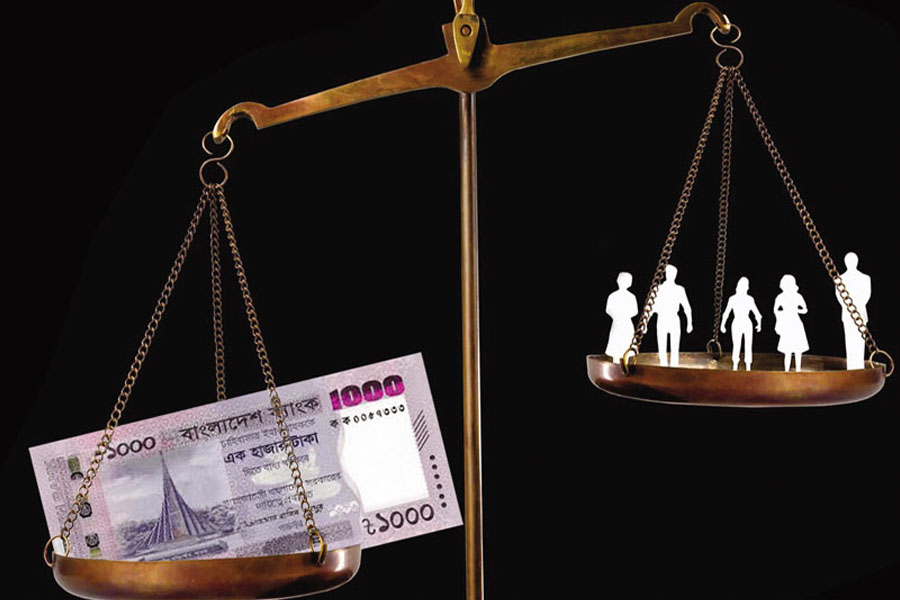
Published :
Updated :

Regular loss of lives under most unfortunate circumstances has become a part of the city dwellers' precarious existence in the bustling megacity of Dhaka. The tragic death of 35-year-old Abul Kalam Azad from the bearing pad of metro rail pier falling on his head in Farmgate area has once again brought to the fore the issue of fragility and uncertainty of human life in the capital.
In this bustling and teeming city of about 20 million, danger seems to lurk at every step, around every corner and in every direction. For Azad, death fell from the sky. For others, it waits beneath the ground as open manholes dot the city streets and footpaths in many areas. In June, a woman fell into an uncovered manhole in the Tongi area, and her body was recovered after an agonizing wait of 36 hours! Such incidents are not uncommon in Dhaka, although it is the port city of Chattogram that has gained notoriety for open manhole-related deaths, with at least 13 lives lost to this hazard.
Meanwhile, the crash-landing of a fighter aircraft at Uttara Milestone School and College in July stands as another glaring example of a completely avoidable tragedy, which claimed the lives of 34 students and teachers. Then there are frequent instances of preventable deaths in factories that go up in flames while workers toil inside, often with gates locked. A recent such fire incident in Mirpur killed 16 workers.
Not to mention the regular loss of lives and limbs under the wheels of runaway buses, auto-rickshaws, or garbage trucks due to reckless driving and blatant disregard for traffic rules. Even while simply crossing a road, no one knows when commuters might find themselves trapped between two competing buses. Such is the callous disregard for public safety that even a simple stroll on the street can sometimes prove tragic. Last year, a female official of Bangladesh Bank died after a brick chip fell on her head from a building in the Mouchak area. Before that, flyover girders came crashing down in Uttara, claiming four lives, including those of two children.
Eating out with loved ones is also fraught with danger, as one never knows when an eatery might turn into an inferno. All the while, the risk of falling prey to street criminals or being caught in the crossfire of political clashes looms like a shadow from which no one can escape. The sheer variety of ways in which life can be abruptly cut short raises a haunting question: is this a city, or a death trap?
Owing to the poor state of governance reflected in all sectors, at all levels, many of these tragic incidents are not the result of human error or inescapable circumstance. Instead, they are caused by human neglect and gross omissions that almost border on contempt for safety rules. Thus, though such incidents are often passed off as accidents, they are, in fact, virtually invited. Social scientists and urban planners rightly observe that these are not mere accidents - they are murders by managerial failure.
After such preventable deaths, it is customary for the authorities concerned to form a probe body. But those whose negligence allows these tragedies to befall the city's residents are rarely held accountable. Instead, the incidents are swept under the carpet with token compensation to the victims' families, while safety standards remain unchanged. As no one is punished and safety measures are not improved, one fatal mishap inevitably follows another, perpetuating a vicious cycle of neglect and impunity.
Safety at workplaces and public spaces is not a matter of pity or benevolence towards citizens; it is their fundamental right. Every individual who steps out to earn a living, commute through the city, or simply take a walk on the street deserves the assurance of returning home safely. The relevant government agencies, city authorities, factory owners, and private business or property owners are all legally and morally bound to ensure this right in their respective areas. But when no one is held accountable for negligence that jeopardises public safety, and the responsible bodies can get away with offering only meagre compensation to victims, why would they bother giving adequate attention to ensuring public safety?
Since the announcement of the Tk 5 lakh compensation package for the tragic death of Abul Kalam Azad under the Dhaka Metro Rail, one question has been doing the rounds on social media: is a human life so cheap?
Death or disability of workers has multidimensional implications on the economy and society. While the death or disability of workers seriously hampers production processes, absence of an earning member throws his/her family members in dire straits. The situation is particularly dire in Bangladesh as life insurance coverage is virtually non-existent.
Putting a monetary value on a person's life may seem impossible. But after a wrongful death, such a grim financial calculation is crucial for two reasons. Firstly, to safeguard the financial and emotional needs of the surviving family- in Azad's case, his wife Irene Akhter Priya is left to raise their two young children alone. Secondly, a substantial compensation could serve as a deterrent, compelling concerned authorities to take public safety measures more seriously. The government can use various international matrices to prepare an adequate and fair compensation for the victims of every preventable tragedy.
aktuhin.fexpress@gmail.com


 For all latest news, follow The Financial Express Google News channel.
For all latest news, follow The Financial Express Google News channel.